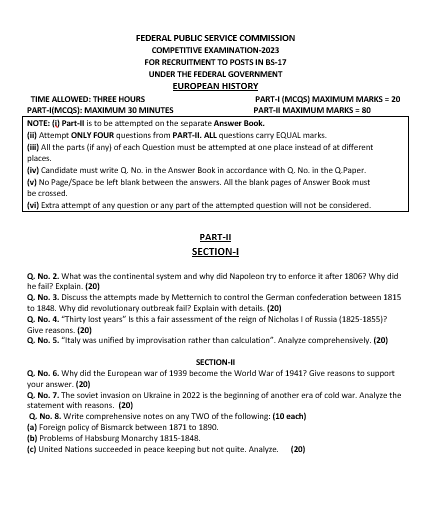Table of Contents
ToggleEuropean History 2023
SECTION-I
No. 2. What was the continental system and why did Napoleon try to enforce it after 1806? Why did he fail? Explain. (20)
No. 3. Discuss the attempts made by Metternich to control the German confederation between 1815 and 1848. Why did the revolutionary outbreak fail? Explain with details. (20)
No. 4. “Thirty lost years” Is this a fair assessment of the reign of Nicholas I of Russia (1825-1855)? Give reasons. (20)
No. 5. “Italy was unified by improvisation rather than calculation”. Analyze comprehensively. (20)
SECTION-II
No. 6. Why did the European war of 1939 become the World War of 1941? Give reasons to support your answer. (20)
No. 7. The soviet invasion of Ukraine in 2022 is the beginning of another era of cold war. Analyze the statement with reasons. (20)
No. 8. Write comprehensive notes on any TWO of the following: (10 each)
- Foreign policy of Bismarck between 1871 to 1890.
- Problems of Habsburg Monarchy 1815-1848.
- The United Nations succeeded in peacekeeping but not quite. Analyze.
Summaries of Questions:
No. 2. What was the continental system and why did Napoleon try to enforce it after 1806? Why did he fail? Explain.
The Continental System was a blockade strategy Napoleon implemented to weaken Britain by closing European ports to British goods. He aimed to disrupt Britain’s economy by isolating it from the rest of Europe. However, Napoleon failed due to various factors: the system was difficult to enforce across a vast empire, smuggling was rampant, and countries like Russia and Spain resisted the blockade, which ultimately led to the weakening of France’s influence.
No. 3. Discuss the attempts made by Metternich to control the German confederation between 1815 and 1848. Why did the revolutionary outbreak fail? Explain with details.
Metternich, Austria’s foreign minister, aimed to control the German Confederation by maintaining conservative rule and suppressing liberal and nationalist movements. He used censorship, surveillance, and military repression to prevent revolutions. The revolutionary outbreak of 1848 failed because of fragmented opposition, lack of unity among revolutionaries, and the strong influence of reactionary monarchies, including Austria’s military intervention.
No. 4. “Thirty lost years” Is this a fair assessment of the reign of Nicholas I of Russia (1825-1855)? Give reasons.
The “Thirty Lost Years” is a criticism of Nicholas I’s reign, highlighting his conservative and autocratic policies that stagnated Russian progress. While his reign was marked by strict control, repression of reform movements, and failure to modernize the economy, it is also important to recognize Russia’s military successes and territorial expansion during this time. Nonetheless, his lack of reforms led to internal dissatisfaction and made Russia more vulnerable to later crises.
No. 5. “Italy was unified by improvisation rather than calculation”. Analyze comprehensively.
Italy’s unification in the 19th century was largely the result of a series of unplanned, spontaneous actions rather than a single, well-calculated strategy. Leaders like Cavour, Garibaldi, and Mazzini had differing goals, but their combined actions, shifting alliances, and reactions to circumstances led to the unification. The lack of a single, coordinated plan meant that unification was more accidental than a result of precise political calculation.
No. 6. Why did the European war of 1939 become the World War of 1941? Give reasons to support your answer.
The European War of 1939 escalated into World War II in 1941 due to the entry of major global powers. Germany’s invasion of the Soviet Union in June 1941 (Operation Barbarossa) and Japan’s attack on Pearl Harbor in December 1941 brought the U.S. and the Soviet Union into the conflict, expanding it beyond Europe. These developments marked the global scale of the war, transforming it into a worldwide conflict.
No. 7. The Soviet invasion of Ukraine in 2022 is the beginning of another era of cold war. Analyze the statement with reasons.
The 2022 Russian invasion of Ukraine has been described as the start of a new Cold War due to its geopolitical consequences. The conflict has led to heightened tensions between Russia and Western powers, particularly NATO and the U.S. Russia’s aggressive actions, alongside economic sanctions and military support for Ukraine, have drawn lines of division reminiscent of the Cold War era. This rivalry is characterized by ideological, military, and economic confrontations between opposing blocs.
No. 8. Write comprehensive notes on any TWO of the following:
(a) Foreign policy of Bismarck between 1871 to 1890.
Bismarck’s foreign policy aimed at maintaining peace in Europe and securing Germany’s position after its unification in 1871. He skillfully isolated France diplomatically through alliances like the Triple Alliance with Austria-Hungary and Italy and the Reinsurance Treaty with Russia. Bismarck sought to avoid conflicts on multiple fronts, focusing on strategic diplomacy and keeping Europe stable to prevent any threat to Germany’s security.
(b) Problems of Habsburg Monarchy 1815-1848.
The Habsburg Monarchy faced numerous problems between 1815 and 1848, including ethnic and national tensions within the diverse empire. The various ethnic groups (Germans, Hungarians, Czechs, Slavs, Italians) sought greater autonomy, creating challenges to centralized rule. Political repression and attempts at reform were met with resistance, leading to the 1848 Revolutions, which saw widespread uprisings across the empire that the monarchy struggled to suppress.
(c) The United Nations succeeded in peacekeeping but not quite. Analyze.
The United Nations has been successful in peacekeeping in certain conflicts, providing a platform for diplomacy and humanitarian assistance. However, its effectiveness has been limited by political divisions among permanent Security Council members and the challenges of enforcing peace in complex conflicts. While the UN has played a critical role in some regions, its inability to prevent major wars or mediate in key crises has raised questions about its overall success in global peacekeeping.
